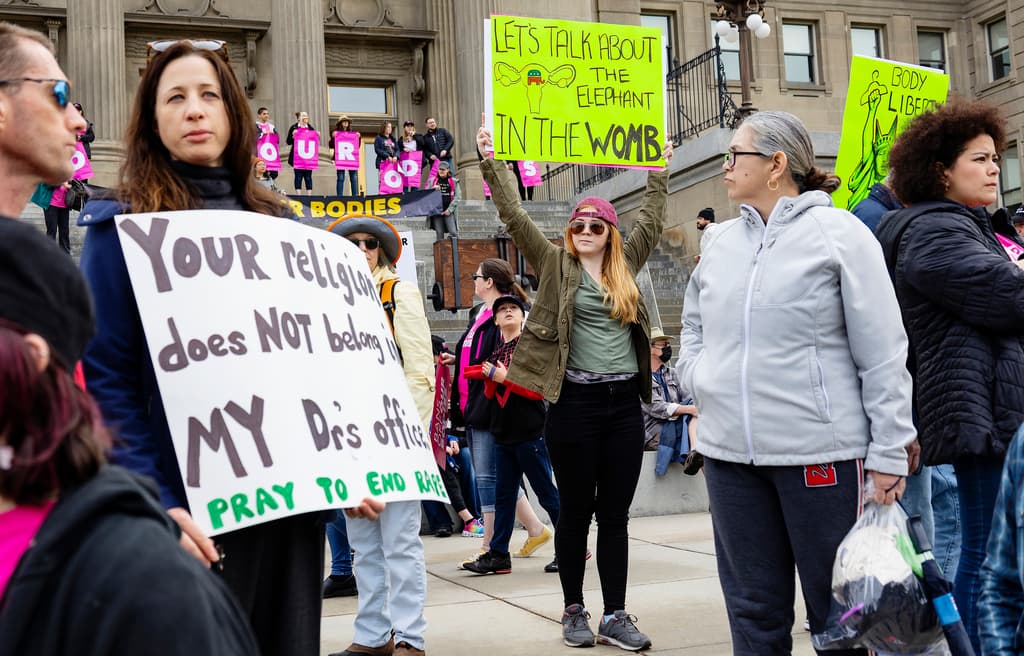After Landslide Loss in Wisconsin, Republicans Begin To Fret Over the Abortion Question
Clearly, GOP leaders in Idaho did not get the memo.

Republicans are becoming more and more concerned that they are alienating the independent voters they need in order to win elections by enacting stringent anti-abortion measures that are clearly off-putting to the majority of Americans.
On Thursday, for example, Idaho became the first state to ban interstate travel in order to obtain an abortion for minors, an action described as “abortion trafficking” in the legislation. The Idaho state director of Planned Parenthood Alliance Advocates, Mistie DelliCarpini-Tolman, told NBC News it is the “most extreme bill” she has ever seen.
Clearly, GOP leaders in Idaho did not get the memo. Backlash to laws banning abortion at six or 12 weeks, or other restrictions on interstate travel as Idaho has done, has their counterparts in other states concerned that there will be blowback at the polls for years to come.
On Tuesday, Judge Janet Protasiewicz flipped a seat on the Wisconsin supreme court, giving the liberal justices a majority for the first time in decades. Her campaign ran explicitly on the promise that she would vote to declare the state’s 1849 abortion ban unconstitutional.
She defeated her conservative opponent by more than 10 points thanks to the support of traditionally Republican, college-educated suburbanites and massive turnout among University of Wisconsin students.
“Abortion is still an issue,” GOP chairwoman Ronna McDaniel told Fox News the day after the Wisconsin election. “I’m a suburban woman, I know this is an issue.”
One proposed middle ground is a 15-week abortion ban that includes exceptions for rape, incest, and the life of the mother. Senator Graham introduced such legislation last year, saying that most developed countries “limit elective abortion” after 15 weeks.
According to a Wall Street Journal poll after Mr. Graham’s introduction of the bill, 48 percent of Americans said they support such a bill and 43 percent opposed it.
The problem for Republicans is that a federal ban conflicts with the long-espoused goal of returning the issue to the states, which the Dobbs case did. Even some of Mr. Graham’s most conservative colleagues said they would not support his bill. Senators Cornyn and Hawley said they want states to deal with it themselves.
Senator Tuberville said in an interview with CNBC that he’s “not for” having the federal government legislate the issue. “Roe v. Wade was shot down by the Supreme Court. It didn’t do away with abortion, it just said: ‘send it back to the states and let the people vote for it,’” he said.
The policy director for the conservative American Principles Project, Jon Schweppe, told the Sun that the Republican Party can’t let Democrats define the entire party as a group of “militant pro-lifers.” Instead, he said, it needs to offer a competing argument as to why it’s important to fight for the unborn.
“There’s a lot of different approaches for the Republicans,” he said. “For a long time we’ve been arguing against late-term abortion, which is a 70–30 issue for us. We’ve also supported a ‘pain capable’ bill,” a 20-week ban, “that’s worked for a long time.”
He argued that Republicans mistakenly ceded ground to supporters of abortion rights by not laying out substantive policy goals after the Dobbs decision.
“Republicans have been spooked, so a lot of them are saying nothing. Protasiewicz was running on abortion explicitly while Kelly ran on crime. He didn’t really answer the attacks,” Mr. Schweppe said of Tuesday’s Wisconsin election. “I think it’s fair to say abortion was the issue driving that race.”
According to a Pew Research poll from 2022, abortion rights remain broadly popular in the United States. Overall, more than 60 percent of Americans believe abortion should be “legal in all or most cases.” Nearly every religious group — even Catholics — agree with that sentiment. Among 18 to 29 year-olds, 74 percent believe the practice should remain legal.
It isn’t just polling that bears this out — there have been ballot measures across the country since the Dobbs decision that continuously show Americans in both red and blue states want abortion services to remain legal.
In Michigan last year, voters affirmed the right to an abortion by a margin of 57 to 43 points. A constitutional amendment in Kentucky that would have declared there is no right to an abortion failed by five points. In Montana, voters rejected a measure that imposed criminal penalties on doctors who did not keep nonviable fetuses alive.
In one of the more shocking votes last year, residents of Kansas rejected a ballot measure that would have declared there was no right to an abortion in the Kansas constitution. The measure failed by nearly 20 points.
Despite these electoral results showing that even voters in deep-red states want abortion to remain legal in at least some cases, many governors are pushing forward with strong protections for the unborn, even if it may come back to haunt them politically.
On Monday, Governor DeSantis signed a six-week abortion ban that allows exceptions for rape, incest, and the life of the mother. “Life is a sacred gift worthy of our protection, and I am proud to sign this great piece of legislation which represents the most significant protections for life in the state’s modern history,” Mr. DeSantis said in a statement.
Mr. Schweppe said that Mr. DeSantis could pivot from that position, should he choose to run for president.
“If I were DeSantis I would say: ‘The people of Florida wanted a six-week bill, so that’s what we did. If I was president I would fight for a 15-week bill, which is where a lot of Americans are.” Republicans “need to get back on comfortable footing,” Mr. Schweppe said.
Correction: The Idaho state director of Planned Parenthood Alliance Advocates, Mistie DelliCarpini-Tolman, told NBC News it is the “most extreme bill” she has ever seen. The quote was misattributed in an earlier version.

